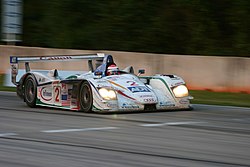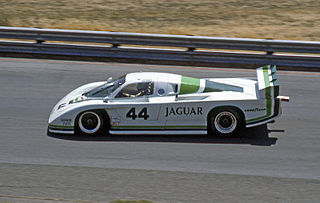
Bill Adam is a Canadian racing driver born in Airdrie, North Lanarkshire, Scotland.

The RS Spyder is a racing car designed by Porsche in conjunction with Penske to compete in Le Mans Prototype Class 2 (LMP2) racing. The car takes its name from the legendary Porsche 550 Spyder of the 1950s. The car marked Porsche's first return to the top level of sports prototype racing since the firm abandoned its Porsche LMP in 1999.

Guy James Mutlow Smith is a British professional racing driver and IB English teacher and coordinator in Brazil, who has competed in various levels of motorsport, most notably the 24 Hours of Le Mans, which he won in 2003, and the American Le Mans Series, which he won in 2011.
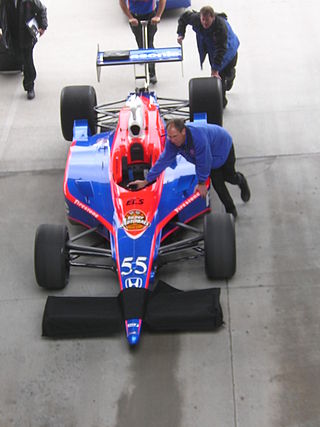
Fernández Racing was a Mexican motor racing team that competed in the American Le Mans Series, Champ Car, the IRL IndyCar Series, and the Rolex Sports Car Series. The team was co-founded by Adrian Fernández and Tom Anderson in 2001.
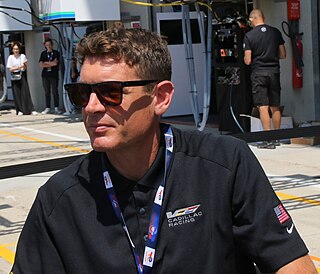
Richard Westbrook is a British professional racing driver noted for his success in racing Porsche and International sports cars. As a junior, he attended St Joseph's College, Ipswich. He has won both the Porsche Supercup international championship and the Porsche Carrera Cup in his native Britain (2004). At the end of the 2007 season, Richard signed a factory contract deal with the German marque Porsche, and the British ace proceeded to take on the world's best on the other side of the Atlantic. The next year (2009), Westbrook won the highly coveted FIA GT2 Championship, taking four victories in the process, establishing himself firmly on the World motor sport stage and in the upper echelons of elite sports car drivers.
The 2006 American Le Mans Series season was the 36th season for the IMSA GT Championship, with the eighth as the American Le Mans Series. It was a series for Le Mans Prototypes (LMP) and Grand Touring (GT) race cars divided into 4 classes: LMP1, LMP2, GT1, and GT2. It began March 18, 2006, and ended October 21, 2006 after 10 races.
Dyson Racing is a professional sports car racing team based in Poughkeepsie, New York in the United States. Founded by Rob Dyson in 1974, the team competed successfully in North American sports car racing series, including the IMSA GT Championship and American Le Mans Series.
Alex Job Racing is a former professional sports car racing team based in the United States. The team, which is noted for its long-time association with Porsche, has competed in the American Le Mans Series, the IMSA GT3 Cup Challenge series, and the Rolex Sports Car Series, and fields a two-car effort in the Tudor United SportsCar Championship. On November 22, 2017, it was announced that Alex Job Racing will cease its professional racing operations to focus on its historic restoration and competition business.

Johnny Mowlem is a professional British racing driver. During his career Mowlem was ranked amongst the best sports car/GT drivers in the world. Mowlem famously fell off his chair whilst commentating at the 2023 Le Mans 24hr race, having competed in every class of world championship sports car racing.
Highcroft Racing was an American auto racing team based out of Danbury, Connecticut and founded by driver Duncan Dayton in 1989. Initially founded for Dayton's involvement in historic motorsport, specifically the restoration and preparation of classic automobiles, the team was expanded for Dayton's entry into the USAC Formula Ford 2000 series in 1994. The team entered a partnership with Intersport Racing in 2003 and entered the American Le Mans Series (ALMS).

João Ricardo da Silva Coelho Barbosa is a Portuguese auto racing driver. He currently competes in the IMSA WeatherTech SportsCar Championship for Sean Creech Motorsport in the LMP2 class.

The 2009 American Le Mans Series season was the 39th season for the IMSA GT Championship, with it being the eleventh season with the American Le Mans Series moniker. It began on March 21, 2009, and ended on October 10, 2009 after ten events. The series was composed of Le Mans Prototypes (LMP) and Grand Tourer (GT) race cars divided into four classes: LMP1, LMP2, GT1, and GT2. A fifth category, known as the Challenge class, was also added for select races and featured Porsche 997 GT3 Cup cars from the IMSA GT3 Cup Challenge. 2009 was also the final year for GT1, with Corvette Racing abandoning the class after Long Beach and switching over to much more competitive GT2 class.

The 2009 Mobil 1 12 Hours of Sebring was the 57th running of the 12 Hours of Sebring and the opening round of the 2009 American Le Mans Series season. It took place at the Sebring International Raceway, Florida on March 21, 2009. Three new cars made their debut at Sebring: Audi's diesel R15 TDI, Acura's first LMP1 entry the ARX-02a, and the return of the BMW M3 to the GT2 category. It was also the last time GT1 category raced at the event.
The 2010 American Le Mans Series season was the 40th overall season for the IMSA GT Championship, and the twelfth as the American Le Mans Series presented by Tequila Patrón. It was also the first season in which the ALMS used a revised structure for its four classes, as well as the first year in a three-year sponsorship deal with Patrón. The season began with the 12 Hours of Sebring on March 20 and ended with the Petit Le Mans on October 2, completing nine total races.
Muscle Milk Pickett Racing was a motorsports group from Indianapolis, Indiana. The team was founded in 2007 by CytoSport co-founder and former IMSA GT Championship driver Greg Pickett. Since 2007, Pickett's team has competed in the United SportsCar Championship, the American Le Mans Series, the 24 Hours of Le Mans and the IMSA GT3 Cup Challenge. The team officially closed in 2014.
Intersport Racing is a former American auto racing team founded by Jon Field. The team was based in Dublin, Ohio. They previously operated two Oreca FLM09 sports cars in the American Le Mans Series. At current, the company has transitioned into diet supplements.
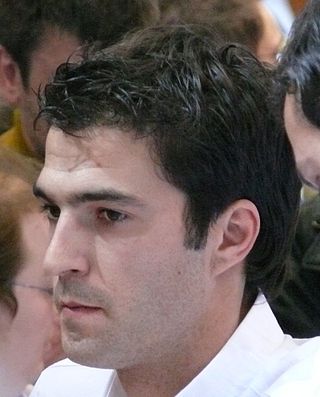
Lucas Luhr is a German racing driver. He is a staple of the American Le Mans Series during the 2000s and early 2010s, winning the GT class with Porsche in 2002, the LMP2 category in 2006, and taking the overall LMP1 championship as part of the Audi Sport North America works outfit in 2008. He also won the P1 title in 2012 and 2013, driving for Honda-fielding Muscle Milk Pickett Racing.

Mike Rockenfeller, nicknamed "Rocky", is a German professional racing driver and was an Audi factory driver competing in the DTM and the FIA World Endurance Championship. He won his first DTM title in 2013, driving for Audi Sport Team Phoenix. He also won the 2010 24 Hours of Le Mans.

Romain Dumas is a French racing driver and driver for Glickenhaus in the World Endurance Championship. He first started out in karting and single-seater before becoming an expert driver in endurance racing, GT and sport-prototype. He has won the greatest races of the discipline, such as the 24 Hours of Le Mans, the 24 Hours of Spa, the Nürburgring 24 Hours, and the 12 Hours of Sebring. He has been one of Porsche's factory drivers since 2004. He's also been contracted to Audi from 2009 to 2012, Volkswagen from 2017 to 2019, and Ford Performance since 2022. Adding to this, Dumas is a Chopard ambassador.

Timo Bernhard is a former driver from Germany. He was a sports car driver from Porsche, but was seconded to Audi for selected events in 2009 and 2010. He is the ninth and most recent driver to complete the informal triple crown of endurance racing. On 29 June 2018, he became the first person in 35 years to break the all-time Nürburgring Nordschleife lap record, set by Stefan Bellof in 1983 with a Porsche 956, in a derestricted Porsche 919 Evo with a time of 5:19.546.

